May 18, 2022
Essential SEO Reporting Tools (and Free Checklist)
Search engine optimization (SEO) is without a doubt one of the most essential marketing competencies you can master.
If you know how to do SEO analysis and report the right metrics to your manager or CEO, you can validate the value of your content marketing efforts while developing campaigns or strategies to boost your brand’s search engine rankings for relevant keywords or terms.
Below, we'll look at what SEO is and why it’s important and have look at the best SEO analysis tools for beginners.
If you're looking for a handy version of these SEO Reporting Tools, just download our checklist. It will cover everything you need to know to conduct an effective SEO analysis.
The importance of SEO reporting
Through SEO analysis, you can gain a deeper insight into your company’s current organic traffic sources while grasping exactly how consumers interact with your website.
Without an analytical approach to your SEO strategy, you’re unlikely to produce content that offers direct value to your audience or is deemed indexable by the likes of Google. If you fail to rank for the right key terms or boost your online authority, you will quickly fall behind the pack.
SEO reporting tools will be your eyes in the dark, serving up the insights, information, and data you need to continually evolve your search engine optimization strategy across every channel or touchpoint imaginable (from blog and landing pages to Facebook, YouTube, and beyond).
In our hyper-connected tech-driven age, a mix of accessible SEO analysis tools exist that shed detailed light into where your on-page and off-page SEO methods work and the areas that might need improvement.
Let’s dive in.
1. Google Analytics and Google Search Console
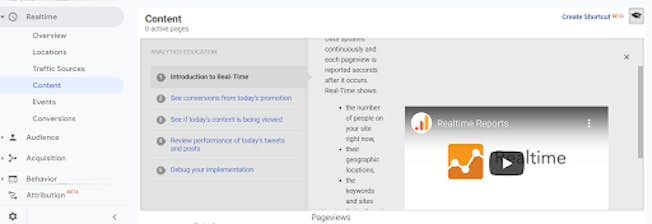
As the primary go-to tool for digital marketers, Google Analytics is a trusted platform that offers a wealth of information concerning your customers demographics, preferences, engagement activities, and browsing behaviors (among other important insights).
The best thing about Google Analytics is that there are plenty of free practical how-to guides on how to use as well as navigate the platform. To get started, have a look at our Google Analytics Goals Guide: How to Set Up And Track Your Bottom-Line KPIs for advice on how to use the platform to your advantage
For SEO analysis, Google Analytics and Google Search Console are tools that will help you measure a wealth of relevant metrics based on your specific search-based goals and benchmarks.
Here are the main Google Analytics and Search Console SEO metrics you should focus on to spot trends, identify an issues or weaknesses, and track your ongoing performance:
- Keyword rankings: where your pages or content are ranking or specific keywords or search terms
- Organic traffic: a clearcut gauge of the organic traffic you’re receiving as a result of your SEO efforts
- Organic click-through rate: a metric that will give you a solid idea of whether your title tags and meta descriptions are inspiring web searchers to click through and actually interact with your content
- Organic conversions: report data that will tell you if your SEO content is impactful and relevant enough to close conversions. Here you can measure conversions including email newsletter sign ups, free trial or demo uptake or purchases, for instance
- Top exit pages: this particular SEO analysis metric will show the web or landing pages that users are exiting the most. Once you’ve identified your top exit pages, you can pinpoint where you need to make improvements to your content to improve engagement rates and ultimately, boost your search authority.
- Domain authority: your domain authority is important as it will tell you how trustworthy search engines (specifically Google) deem your brand and website to be, while offering an insight into how linkable or share worthy other people or brands find your content.
There are also some alternatives to Google Analytics you should know about as well as a handy tool called URL Profiler that compiles data from Google Analytics and Google Search Console into one accessible interface.
FYI: To help you remain firmly on the analytical pulse, it’s worth knowing that by 2023, Google Analytics as we know it will retire. Instead, search and content marketers will transition to GA4 and Universal Analytics. This transition will prove challenging but our practical guide to GA4 and Universal Analytics will tell you all you need to know to get started.
2. KWFinder
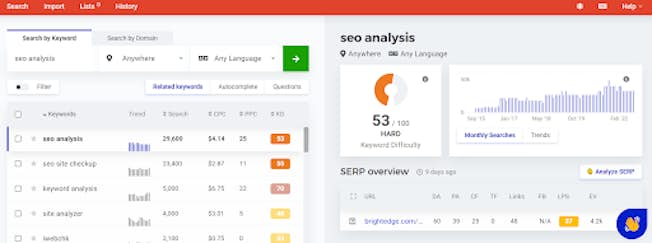
If you’re looking to conduct keyword SEO analysis and share your discoveries or suggestions with your manager or CEO, KWFinder’s interface is accessible, logically, and visually-digestible.
A crafty creation from Mangools, KWFinder offers the option to conduct domain-based keyword searches and see which terms your competitors are using.
By punching a keyword discovery search into the platform, you can gain instant access to an invaluable mix of easy-to-understand information that will help you curate lists of impactful keywords for specific SEO campaigns, content or activities. This insightful information includes:
- A chart-based keyword difficulty visualization that tells you how much overall traffic competition there is for a specific keyword or term
- A keyword popularity and trend chart that shows search volumes over a particular time frame
- A detailed list of relevant keywords with metrics on search volumes, difficulties, and pay-per-click (PPC) costs: a helpful metric for any paid marketing analysis or reporting activities
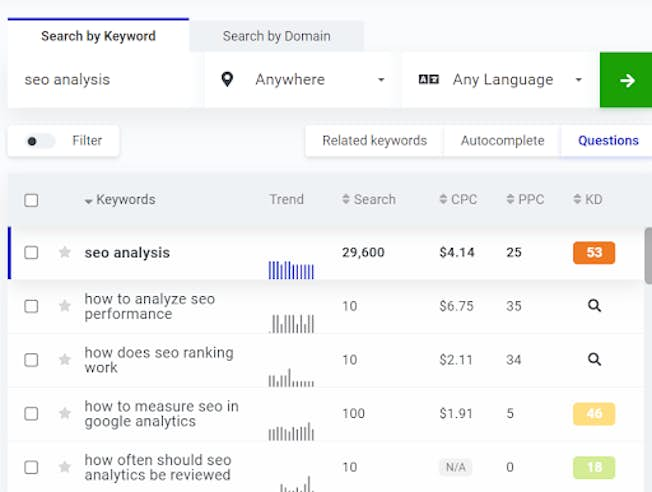
- A keyword questions tab that will show you the most popular or relevant questions people are asking based around a specific keyword. This is particularly effective if you’re analyzing existing content and you’re looking to update or optimize it to better match a searcher’s intent or gain rankings for rich snippets.
Armed with this melting pot of information, you can conduct detailed analysis on fresh keywords for optimizing existing content as well as the terms you believe will prove most valuable for new or emerging search-based campaigns. Once you’ve gathered your information, you can export your prospect lists and discoveries into a CSV-based report.
3. Unbounce landing page analyzer
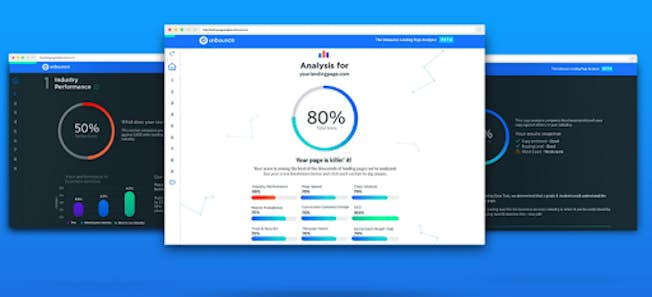
It’s hard to emphasize the importance of user experience (UX) in digital marketing and its impact on search engine rankings, it’s important to conduct on-page SEO analysis based on navigability and usability.
While Unbounce comes complete with a host of advanced tools and functionality, the landing page analyzer lends itself to effective UX-based on-page SEO analysis for beginners.
By typing the desired URL into the platform and detailing your page’s target keywords, Unbounce’s algorithm will serve up a straightforward report that gives a total page score while digging deeper into the UX-centric elements that count.
As well as page performance speed, SEO performance, and trust & security scores, Unbounce’s on-page analyzer tool provides a metric on Message Match (a score based on the relevancy and value of your page content—or in other words, a rating on how much it delivers on its promises)—a big SEO ranking factor.
As Unbounce measures a mix of important UX and performance-centric elements, you will be able to analyze what’s working and what needs improvement. Unbounce’s on-page report also offers a color-coded priority list of the practical measures you will need to undertake to improve your pages’ UX offerings, content, design elements, and messaging for improved SEO performance.
Simply sign up, get acquainted with the platform, enter your URL, and start analyzing. This tool is so intuitive and visually accessible that you will gain access to a wealth of priceless SEO analysis insights in a matter of minutes.
4. PageSpeed Insights
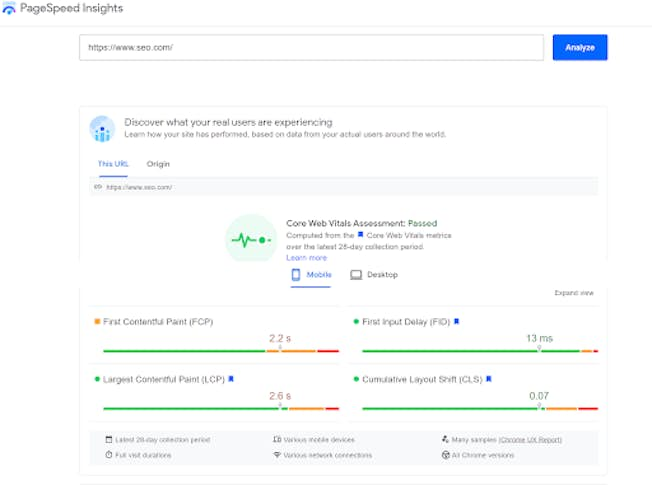
In addition to the quality and shareability of your content, your domain authority, and your UX offerings, your page speed performance will have an impact on your company’s overall SEO performance.
PageSpeed Insights is a powerful free tool that is easy to pick up and it returns detailed Core Web Vitals assessments as well as a breakdown of your page’s speed and loading performance. The visuals are easy to understand and with one simple search, you will get a comprehensive list of recommendations that will help you improve your pages’ performance.
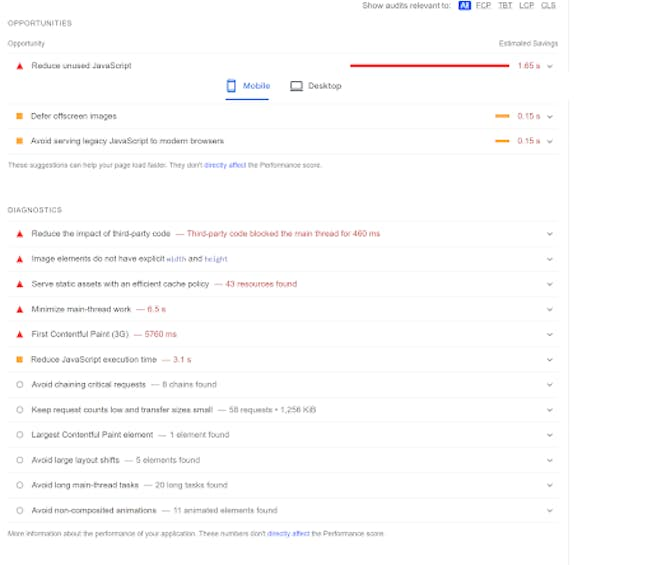
You can dig deeper into the platform’s recommendations (based on either mobile or desktop analysis) or cherry pick what you feel is most relevant or valuable and report these concrete findings to senior stakeholders within the business. A simple tool that will add an extra layer of intelligence to your ongoing SEO reporting efforts and strategy.
Bonus tools to consider
The four SEO reporting and analysis tools above will give you a well-rounded view of your brand’s search engine optimization-based activities and performance.
Using these essential tools will also give you guidance on what to do to improve your strategy while offering concrete metrics that will validate your initiatives or suggestions. Here are some other handy tools you might want to check out:
A powerful keyword suggestion and research tool with workflow optimization capabilities and a highly-interactive visual interface.
A quick-fire search and go keyword suggestion tool that suggests relevant terms that will enhance your content for specific audiences.
Screaming Frog’s SEO Spider tool
An excellent SEO tool for website or on-page optimization and evaluation, this neat platform is perfect for technical and UX-based activities or initiatives.
A cohesive all-in-one SEO tool that allows you to perform site audits, keyword research, content comparisons, and rank tracking from the same interface.
Another versatile and industry-renowned SEO platform that is particularly good for rank tracking and backlink analysis.
Free SEO checklist
Now that you know which SEO analysis and reporting tools to use and which metrics or features to focus on, here’s a free checklist to help you make sure that you’ve covered all bases:
Related
Upgrade to Power Membership to continue
your access to thousands of articles, toolkits, podcasts, lessons and much much more.
Become a Power Member- Login
- View Courses
- - - -
- Courses
- Resources
- - - -
- My Account
- Change Password
- Logout





